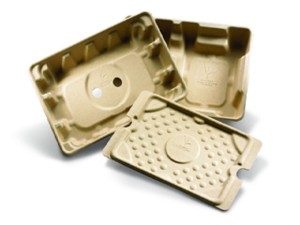 Paper and plastic may be the most common packaging options, but they’re not the only ones. In a first of its kind move, Dell has pioneered the use of bamboo to cushion some of its lightweight products. This giant member of the grass family, found in everything from food to flooring, is now also a sustainable packaging solution.
Paper and plastic may be the most common packaging options, but they’re not the only ones. In a first of its kind move, Dell has pioneered the use of bamboo to cushion some of its lightweight products. This giant member of the grass family, found in everything from food to flooring, is now also a sustainable packaging solution.
Bamboo is a renewable resource. Bamboo is a family of grass and not a tree. It matures quickly in as little as three to five years, much faster than hardwood trees which can take upwards of twenty years or more to reach maturity. Some species of bamboo grow more than three feet each day. Bamboo sends out new shoots after each harvest and hence there is no need for additional planting or cultivation.
Bamboo absorbs greenhouse gases. Bamboo has unrivalled capacity to capture carbon and releases 35% more oxygen into the atmosphere than an equivalent stand of hardwood trees.
Bamboo doesn’t need any fertilizer or pesticide to grow. Unlike most cash crops, bamboo requires no agricultural chemicals to thrive. Moreover, it requires less energy and water to grow.
Bamboo grows in a variety of conditions. Bamboo can grow in arid regions where droughts cause other crops to fail and since the roots are left in place after harvesting, it helps to preserve vital moisture in the soil. From low wetlands to higher elevations in the mountains, bamboo thrives in a wide range of climates.
Bamboo helps in soil protection. When hardwood forests are clear-cut, erosion inevitably occurs as the topsoil and nutrients are washed away by rainfall. The eroded soil then clogs rivers and streams and affects the lives of people and animals living downstream. Bamboo sends out new shoots after each harvest. It protects steep slopes, soils and water ways and prevents soil erosion.
Dell’s bamboo cushioning’s environmental profile extends beyond the way it’s harvested and processed. It has worked with Unisource Global Solutions to ensure that the materials would meet the U.S. FTC’s stringent guidelines for recyclability — testing the viability of incorporating the bamboo into existing recycling streams and surveying recycling facilities about acceptance.
Adding to its environmental credentials, Dell bamboo packaging has been certified as compostable as per ASTM International standards by an independent test laboratory. This certification ensures that the bamboo will compost satisfactorily and biodegrade at a rate comparable to known compostable materials. It also ensures that the compost resulting from the packaging’s degradation process is of good quality and can sustain plant growth.
